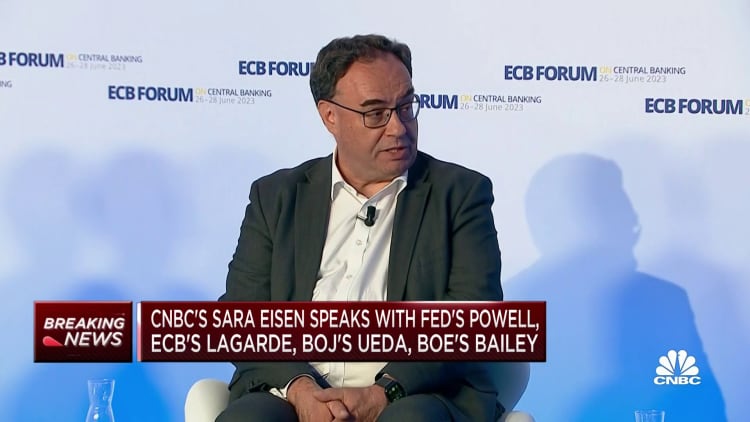A key U.K. mortgage rate on Tuesday climbed to its highest level for 15 years, surpassing levels reached in the aftermath of September's "mini-budget" crisis and deepening fears of a catastrophe for struggling homeowners.
The average rate of a two-year fixed deal now stands at 6.66%, according to figures from data provider Moneyfacts, a modest increase from Monday. It means mortgage costs are now at their highest level since August 2008 during the global financial crisis.
The 2-year rate hit 6.65% on Oct. 20 last year, shortly after former Finance Minister Kwasi Kwarteng's package of unfunded tax cuts sparked chaos in the mortgage market and threatened to topple pension funds.
The average 5-year mortgage rate rose to 6.17% on Tuesday, Moneyfacts said, a marginal increase from Monday but still some way off the 6.51% level reached on Oct. 20.
U.K. mortgage costs, which had staged a recovery in the months following the "mini-budget" crisis, have soared recently following 13 consecutive rate hikes by the Bank of England.
Most recently, the central bank increased rates by 50 basis points to 5%, a bigger increase than many had expected. The surprise move will affect millions of homeowners as the interest rates on many mortgages in the U.K. are directly linked to the central bank's base rate.
Renters, too, are likely to see their payments increase as buy-to-let landlords pass on higher mortgage repayments.
It comes as the Bank of England battles stubbornly high inflation, with Governor Andrew Bailey reportedly saying on Monday that the central must "see the job through" on bringing down prices.
Many believe further interest rate hikes are inevitable in the coming months.
'Mood music is changing'
"Markets expect interest rates to go higher, mortgage payers are marching towards fixed rate renewal dates with a sense of dread, and employers are nervous," Danni Hewson, head of financial analysis at AJ Bell, said Tuesday.
"The mood music is changing and pretty soon bad news won't be in the lining of good news, it will just be bad news," she added.

British homebuyers tend to take out mortgages that have a fixed rate for two or five years. When the duration is up, they either move to a new fixed rate or accept a variable rate.
Research by the National Institute of Economic and Social Research, a leading independent think tank, recently estimated that the Bank of England's 50-basis-point hike last month would see 1.2 million U.K. households (4% of households nationwide) run out of savings by the end of the year because of higher mortgage repayments.
That would take the proportion of insolvent households to nearly 30% (roughly 7.8 million), the NIESR said, with the largest impact set to be incurred in Wales and the northeast of England.
'Further misery on mortgage holders'
Matthew Ryan, head of market strategy at global financial services firm Ebury, said Tuesday that financial markets were pricing in a peak in U.K. interest rates of around 6.35% in the first three months of 2024, up from 5% currently.
This "would surely make the BoE the most hawkish major central bank in the world between now and then," Ryan said.
"We think that markets are slightly ahead of themselves, although we do expect another 50 basis point hike from the [Monetary Policy Committee] in August, with a real risk that the base rate tops out above 6%."
He said this is "set to heap further misery on mortgage holders, particularly as 700,000 fixed term contracts are set to expire in the second half of 2023 alone."
"We suspect that higher mortgage rates will contribute to weaker economic activity in early-2024, and we are now not ruling out a technical recession in the first half of next year," Ryan added.


